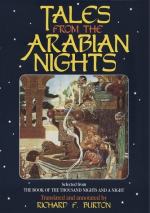2. Ilam-en-Nas. Historical tales and anecdotes of the time of the early Kalifahs. Translated from the Arabic and annotated by Mrs. Godfrey Clerk, author of “The Antipodes, and Round the World.” London, 1873.
Many of these anecdotes, as is candidly admitted by the authoress in her Preface, are found with variations in the Nights, though not translated by her from this source.
3. The New Arabian Nights. Select tales not included by Galland or Lane. By W. F. Kirby, London, 1882.
Includes the following tales, slightly abridged, from Weil and Scott: Nos. 200, 201, 264, 215, 209, and 208.
Two editions have appeared in England, besides reprints in America and Australia.
Separate editions of single or composite tales.
6e (ee).—The Barber’s Fifth Brother.
Mr. W. A. Clouston (in litt.) calls attention to the version of this story by Addison in the “Spectator,” No. 535, Nov. 13, 1712, after Galland. There is good reason to suppose that this is subsequent to the first English edition, which, however, Addison does not mention. There is also an English version in Faris’ little Arabic Grammar (London, 1856), and likewise in Richardson’s Arabic Grammar. The latter author extracted it from a Ms. belonging to Sir W. Jones.
5.—Nur Al-din and Badr Al-din Hasan.
There are two Paris editions of the “Histoire de Chems-Eddine et de NourEddine,” edited by Prof. Cherbonneau. The first (1852) contains text and notes, and the second (1869) includes text, vocabulary and translations.
7.—Nur Al-din and Anis Al-jalis.
An edition by Kasimiraki of “Enis’ el-Djelis, ou histoire de la belle Persane,” appeared in Paris in 1867. It includes text, translation and notes.
9.—King Omar Bin Al-nu’aman.
There is a French abridgment of this story entitled, “Scharkan, Conte Arabe, suivi de quelques anecdotes orientales; traduit par M. Asselan Riche, Membre de la Societe Asiatique de Paris” (Paris and Marseilles, 12mo, 1829, pp. 240). The seven anecdotes appended are as follows: (1) the well-known story of Omar’s prisoner and the glass of water; (2) Elhedjadj and a young Arab; (3)=our No. 140; (4) Anecdote of Elhedjadj and a story-teller; (5)=our No. 86; (6) King Bahman and the Moubed’s parable of the Owls; (7)=our No. 145.
133.—Sindbad the Seaman.
This is the proper place to call attention to a work specially relating to this story, “Remarks on the Arabian Nights Entertainments; in which the origin of Sindbad’s Voyages and other Oriental Fictions is particularly described. By Richard Hole, ll.D.” (London, 1797, pp. iv. 259.)
It is an old book, but may still be consulted with advantage.
There are two important critical editions of No. 133, one in French and one in German.
1. Les Voyages de Sind-bad le marin et la ruse des Femmes. Contes arabes. Traduction litterale, accompagnee du Texte et des Notes. Par L. Langles (Paris, 1814).




